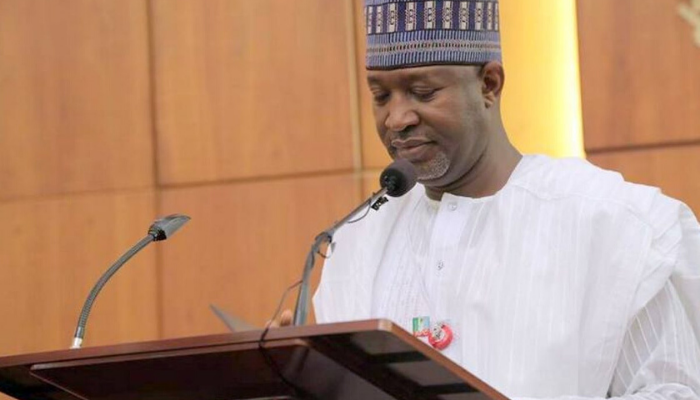The judgement by the Federal High Court, Lagos, asking all parties in the Nigeria Air project to maintain status quo has started generating frenzy in the aviation industry.
Stakeholders, investors and government are expressing mixed reactions over the court judgement. While some argued it was a judgement in the right direction, others argued that it would affect Foreign Direct Investment (FDI), into the sector.
They argued that the court judgement will not only dampen other aspect of the aviation roadmap and private sector participation in the aviation sector, but may put an end to the Nigeria Air Project.
The Nigeria Air project, according to the government was expected to begin operation by the end of the year, but the recent judgement has put everyone including the investors into a fix.
NATIONAL ECONOMY, reports that the Airline Operators of Nigeria (AON), had sued the federal government over the 49 per cent equity share the federal government ceded to the Ethiopia Airline in the proposed national carrier.
The judge, in a judgement by, Justice Lewis Allogoa, said all parties in the suit should stop taking any further steps pending the determination of the motion on notice is granted.
The judge ordered, “that an order of interim injunction is granted restraining the defendants either by themselves, agents, privies, principals or any other persons whosoever from executing the proposed or draft national carrier establishment and agreement between the federal government of Nigeria (represented by the 3rd and 4th defendants) and the strategic equity partner (the 2nd defendant) or giving effect to and or suspending the sale and transfer of the shares & operations of the 1st Defendant by the 2nd Defendant pending the determination of the Motion on Notice.
“That an Order of Maintenance of Status Quo by all parties in this suit from taking any further step(s) in relation to the subject matter of this suit pending the determination of the Motion on Notice is granted. That an Order of Accelerated Hearing of this suit is granted.”
However speaking, the assistant secretary general, Aviation Round Table Initiative (ARTI), Olumide Ohunayo, said the court judgment will help in the future to realise that when the industry stakeholders speak, government should listen.
According to him, Foreign Direct Investment (FDI), will also be hit by this court judgment.
“You can be sure that the judgment will not only affect Nigeria Air, but it will also bring a damp on other aspects of the roadmap that will require private organisations to bring in their fund with this judgment and the resistance of the clarion call of the union on the public to be aware of the concurrent speed of project that has been thrown to the market and getting investors at the last minute.
“This judgment might make investors a bit skeptical and begin to assess what happens if the govt leaves after the election and the hostility in the aviation industry.
“By and large, foreign direct investment will be hit by this court judgment and that will also help in the future to realise that when the industry is speaking, it is more important than unison in the industry and the other aspect that we do not bulldoze our personal opinion. We are talking about the commonwealth of the country, international routes, and bilateral services. it doesn’t belong to one person. Gone are those days when you can say I am in power today, I own you. You do not own it. Everybody must move in tandem and belief in it.
“Supposing the industry was divided, we would have been able to move In this case, it is unison You can’t go ahead with this policy, as we are going to be shortchanged. It is not about the national interest, what you are seeing is the roadmap and self-interest to achieve it irrespective of what President Buhari has achieved.”
Ohunayo, however, decried the Nigeria Air agreement, saying the industry won’t lose its slot, bilateral services and international airspace to Ethiopian airlines.
“Rather than tie our hands and get burnt as it has happened in the past, we are saying no we don’t want to lose our slot, our bilateral services, and international airspace to Ethiopia airlines which will come and take our slot and not bring in anything. Why are they not offering Nigerians and Nigeria Government anything on Ethiopia Airlines?
“But they want to take our slot, give us aircraft that will be maintained by them, that we will lease and pay them, and they will give us top management staff and crew.
“We have a vibrant domestic airline industry of investors. You cannot bring them over and give them power and protection above existing investors which is the crux of this issue.”
Also, the secretary general, Nigerian Union of Air Transport Employee (NUATE), Com. Abba Ocheme, said the Nigeria Air project is a ruse as presently propagated by the minsiter of aviation, Sen. Hadi Sirika.
According to him, the type of FDI the sector needs is the one that will keep its investment in the country and not the one that will lead to repatraition of proceeds out of the country.
He said, “ The Nigeria Air project is now on the court to give its judgement because it is now a purely legal issue. Also, I am not a fan of FDI that come with right hand and take away with the left hand. That is when the investment matures, they repatraite the fund. Ethopia Air will now be operating our Bilateral Air Service Agreement (BASA). We want an airline that will reduce repatraition of funds that we are presently facing now, and not a National Carrier that will have to look for foreign currency for them to repatraite their fund to their country,” he said.
In an exclusive chat with NATIONAL ECONOMY, the chief executive officer, Centurion Aviation Security and Safety Consult, Capt. John Ojikutu (rtd), said the saga would prolong the startup of the project or may keep it in temporary or permanent hold.
Ojikutu, a former commandant, Muritala Mohammed Airport, Lagos, said the domestic airlines may be justified to challenge the federal government but not the the airlines as a competitive operator with the planned National Carrier.
Ojikutu’s words, “The saga would prolong the startup of the Nigeria Air and may keep it on temporary or permanent hold. I had advised against the National Carrier when in 2018 it was clear that those in the management of the project were bent on the partnership with our competitors on the BASA routes.
“Alternative to the National Carrier, I suggested that the assets and the liabilities of Arik and Aero that are under the receivership of AMCON be assessed. Where there are no bankruptcy laws, invite foreign and local investors to buy into the airlines so the debts of the airlines can be ‘offloaded’. Designate the airline as flag carriers if we have problems in the partnership with foreign technical partners and investors from areas other than those who are our competitors on the BASA routes.
“Individuals Nigerian on the board of operators of domestic airlines may be justified to challenge the federal government but not the airlines as a competitive operator with the planned National Carrier. Any Nigerian too as stakeholder in national assets outside commercial aviation can if the Nigeria/Ethopia partnership is seen negatively as subverting the sovereignty and economic development of the Nigeria State.
“Such individual can challenge the equity holdings 5 per cent by the federal government as against 49 per cent of Ethiopian Government as well as the high percentage holdings shares of few individuals in the private companies holdings. What the domestic airlines should be asking from the government is the authority to operate as flag carriers on some of the intercontinental BASA routes and there are many of them.
“Globally, flag carriers other than National Carriers are more in the practice. The markets are there for the private airlines if and only if the government or the courts will not deny them the rights to fly on the BASA routes which are our commonwealth. The only thing they have to do is to ensure they open their doors to the Nigerian public through the Nigeria stock markets,” he said.
Also, the managing director of Top Brazz Aviation and former managing director of the Nigerian Airspace Management Agency, Roland Iyayi, said the proposed national airline would help Ethiopia Airlines achieve its domination of the African market, adding that the Ethiopian national carrier had formed similar agreements in eight other African countries.
He said, “This approach will decimate the local market. Agreement with Ethiopian Airlines will create cabotage. Ethiopian Airlines will come into our domestic market, lower fares (non-competitive fares) with the aim of taking over the market. The choice of Ethiopian Airlines will destroy our industry. We reject this totally.”
Iyayi, who is also a pilot, further said, “In anticipation of the Single African Air Transport Market, Ethiopian Airlines want to dominate the African market. The government is meant to support local carriers. Ethiopian Airlines has partnerships in eight other countries in Africa.
“ET currently has 135 planes. The CEO of the airline has said its plan to increase their fleet to 250 planes in the next five years. The intent is to go into the domestic market of all the African countries where they have footprints. This is simply aviation colonialism. If we take all of this onboard, you will wonder whether the government has the interest of Nigerian airlines at heart or not.”
“What Ethiopia is trying to do in essence is to make sure they have a hold on the largest market in the continent, to be able to project and propel themselves to Nigeria. They intend to double (the number) by 2050. Ethiopia as a country does not really have that market but they have a footprint in several local markets.
“Ethiopia will not help you to create an aviation hub when it has one in Addis Ababa. They are building a new airport. It will be very difficult to see how Ethiopia will commit to a national carrier in Nigeria that will be for the benefit of Nigerians. We dare to say, as AON, that if airplanes are brought into the Nigerian market, the first thing Ethiopia will do, as a strategy, is to do a fare cutting strategy for market penetration. When you cut the fares to compete with the local carriers—Ethiopia is awash with cash —they can afford to come to the market and project a six-month fare with domestic carriers.
“I can guarantee you that if they do that for six months, 90 per cent of the domestic airlines will be out of business. Afterwards, they will now dominate the domestic market through their monopoly. What happens when they increase the fare? Ultimately, Ethiopia will fly international; it will be flying on Nigeria’s designated routes.”





